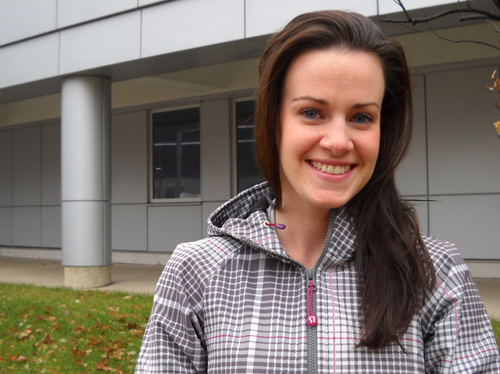At Guelph presents this story as part of a series that highlights University of Guelph leadership in teaching excellence and the scholarship of learning.

As a PhD student, she looked at diet and diseases like Type 2 diabetes. Now as a recently appointed faculty member in her alma mater, Prof. Kerry Ritchie has mostly swapped her research lab for the classroom. Or, perhaps more correctly, she is making a lab out of busy classrooms at both Guelph and the University of Guelph-Humber.
“What excites me most is research relating to the scholarship of teaching and learning,” says Ritchie. This past summer she joined the Department of Human Health and Nutritional Sciences (HHNS) primarily to teach and to study undergraduate learning in HHNS programs and in the kinesiology program at Guelph-Humber.
Together those programs involve more than 1,800 students. Most are enrolled throughout U of G majors in human kinetics, nutrition and nutraceutical sciences, and biomedical science (along with the Department of Biomedical Sciences in the Ontario Veterinary College). The rest are in the Guelph-Humber kinesiology program, where half of the courses are taught by Guelph faculty.
Add in students from other majors taking HHNS courses in biology, nutrition, physiology and anatomy, and you’ve got a big teaching commitment for a research-heavy science department, says Prof. Lawrence Spriet.
He became chair this past summer. That’s when Ritchie joined the department faculty along with Prof. Genevieve Newton. Labelled by Spriet as “career teachers and researchers of learning,” both new faculty members will focus on teaching at both campuses.
Thank goodness for Red Car, says Ritchie, who commutes to Toronto several times a week. She lives in Guelph with her husband, a landscape architecture grad who builds sports fields and tracks; Brett Ritchie and Kerry Mullen were married in 2010.
“It’s forward-thinking of Guelph and this department to recognize the importance of teaching,” says Kerry Ritchie.
Ultimately, she expects that her studies will find their way to academic journals on the scholarship of teaching and learning. For now, she’s launching projects, adding to her own teaching dossier and helping to organize teaching scholarship in the department.
Ritchie will teach four undergrad courses this year. At Guelph, she has a fourth-year offering called “Functional Foods and Nutraceuticals.” At Guelph-Humber, she teaches the third-year courses “Exercise Physiology,” “Nutrition, Exercise and Metabolism,” and “Human Development and Aging.”
Ritchie taps into four years’ worth of teaching experience at Guelph-Humber as a grad student. She’s interested in innovative teaching techniques, particularly for keeping students engaged in large classes.
In “Human Development and Aging,” she challenged 120 students to develop research projects that could be shared with non-scientists. “I was blown out of the water with how well they did. I think they liked being creative. It’s sometimes difficult in science being creative in large classes.”
One group designed a picture book for elementary school kids on sleep and childhood obesity. Others concocted a cooking show about dietary fatty acids and developed an iPhone app with anti-aging tips.
Ultimately, she plans to publish on teaching and learning in peer-reviewed journals on scholarship.
Back at Guelph, she served for a year as a course co-ordinator to help redesign the first-year course “Biological Concepts of Health.” That’s one of three new courses launched in 2010 under a first-year curriculum revamping by the College of Biological Science (http://atguelph.uoguelph.ca/2011/11/first-year-science-curriculum-helps-students-find-their-niche/).
With HHNS colleagues, Ritchie has developed a new unit for scholarship of teaching and learning in the department. Prof. Bill Bettger, the department’s undergraduate curriculum co-ordinator, says that “while the department has always cultivated a tradition of teaching excellence, the scholarly interests of Kerry and Genevieve will help bring a new level of professionalism to our many teaching-related endeavours.”
As a PhD student with HHNS Prof. David Dyck, Ritchie studied metabolism of fatty acid in skeletal muscles and the effect of a hormone on insulin sensitivity. She defended her doctoral thesis in 2010 (http://www.uoguelph.ca/atguelph/10-02-24/featureslearn.shtml).
For her continuing lifestyle and health studies, she’s looking at first-year students’ experience as so-called “emerging adults” aged 18 to 25.
With help from three undergrads, Ritchie has surveyed about 400 first-year students this semester. They’ve asked lifestyle questions about students’ transition from high school, including such things as moving away from home, changes in eating, sleep and exercise habits, and their overall view of health issues.
Helping on the project is fourth-year kinesiology student Katherine Harrison. She’s looking at lifestyle differences between males and females. “The emerging adult population is a very new area of research,” says Harrison. “I know from my personal experiences that there can be many uncertainties associated with this period in our lives. Our findings could help future students in their lifestyle practices and aid in their path to adulthood.”
So far, says Ritchie, “I’m happy to see they all wear their seat belts, mostly practise safe sex, don’t smoke.” On the downside, many report problems with stress and lack of sleep.
Understanding this cohort’s needs might help in supporting students during this critical period in their lives, says Ritchie, who encountered the same issues herself as a student.